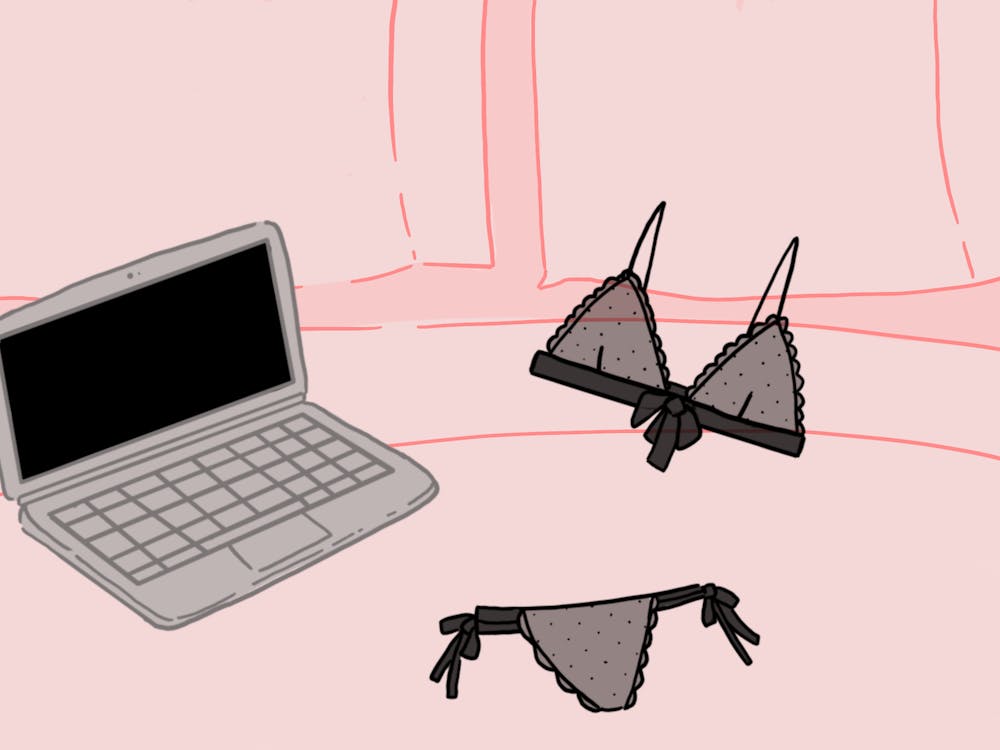Few websites can claim to be the subject of all of the following: intense criticism on social media platforms, a Beyoncé lyric, privacy leaks and hacks, and a prolonged discussion on the treatment of sex workers.
The website in question? OnlyFans.
Founded in 2016 by Timothy Stokes, OnlyFans is a subscription based online platform where creators can post content of their choosing—ranging from fitness videos and recipes to NSFW images and videos. Subscribers can access this content through a paywall that includes a monthly fee, with the platform itself taking a 20% cut of creators' earnings. The site is infamous for its pornographic content, garnering a 75% uptick in creator sign–ups in early April following coronavirus shutdowns worldwide. As countries around the world plunged into tidal waves of unemployment and recessions, OnlyFans, for many, became a mechanism of staying afloat.

photo courtesy of Jasmine Rice/Facebook
A recent Wharton graduate who goes by the internet pseudonym Jasmine Rice (W'20) is in the top 1% of all creators on OnlyFans. She cites the pandemic as being one of the primary reasons for a boost in her OnlyFan's popularity. "With COVID hitting and everyone starting to stay home, there was suddenly a ton of free time, and that's what people ended up doing," she says." Essentially, with the advent of social distancing norms and mandates to 'stay home', there was a concurrent rise in people seeking pleasure through digitized means—a recent survey on sex and relationships during the lockdown found that 34% of women were more open to the idea of exchanging nudes, and that men were more likely to send explicit pictures than they were before social distancing was introduced.
Moreover, OnlyFans seems to hold the promise of authenticity. It feigns intimacy through the direct relationship content creators hold with their subscribers, with no intermediaries other than the site itself. This particular virtue also contributed to its meteoric traction: in the midst of a global disaster, people seemed to crave realism over the 'picture–perfect' mirages associated with sponsored content.
Jasmine's account, however, doesn't feature the explicit content that has become metonymic for OnlyFans. Her content is non–nude and primarily consists of videos of her singing. Still, she affirms that the autonomy OnlyFans creators hold is one of its most attractive qualities. "[Only Fans] is very much about bodily autonomy, and what you want to post—what you're comfortable with posting, what you want to share about yourself and your life is okay," she says.
The ability to regulate one’s autonomy is part of what makes OnlyFans so attractive to sex workers, especially given the tribulations of the pornographic industry. Adult websites are mired in controversy, especially given the lack of legislation to protect performers. The U.S Government generally turns a blind eye to issues surrounding the production of pornography, unless it involve performers under the age of 18—and still, newly legal performers between the ages of 18–21 face numerous difficulties. Rachel Bernard, a former amateur pornographer and one of the subjects of the 2015 documentary film 'Hot Girls Wanted', reported a high level of pressure on performers to partake in acts they were unwilling to do. Other ex–performers have also spoken about the limited agency they are provided with, including Mia Khalifa, formerly one of Pornhub's most popular performers. Despite her content's popularity, Khalifa reported only receiving $12,000 in compensation from the site—a total of $1,000 per film. Given all these claims, OnlyFans seems set up to be the perfect counter by offering creators the agency to control their own content and properly monetize it.
However, OnlyFans creators face an alternate set of hurdles. For one, OnlyFans has become synonymous with a definite stigma. Creators often face a barrage of online harassment, even if they do not engage in sex work. It seems the label of having an OnlyFans account is enough to instigate abuse. For instance, Jasmine receives an overwhelming amount of hate messages for having an account. "If I have any kind of educated opinion, a comeback that I get is 'your opinion doesn't count, you have an OnlyFans,'" she says. This kind of hateful dialogue also persists towards sex workers on the app—RoseWithThorns, another top content creator, reported receiving "constant abuse from random strangers online around my job, slut–shaming me or indicating I have any less worth as a person due to my career."
Resentment of the women on the app seems to stem from an all–too–familiar culprit: misogyny. Female OnlyFans creators are berated for their intelligence, looks, career choices, and above all, comfort in their own bodies. Roughly 40 million Americans watch pornography. "Consumption [of sex work] is okay, it has always been okay," Jasmine says. Yet, the need to debase and demean women who partake in sex work still, paradoxically, persists. Though many are willing to consume explicit content, it perturbs them when the women providing it take agency in the matter. Male creators make up a smaller proportion of OnlyFans, but they are also subject to harassment—often targeting and criticizing their masculinity. Simply put, toxic masculinity is intent on demeaning sex work, irrespective of how much it's consumed.
Sure, OnlyFans seems to hold the implicit promise of empowerment. But it often fails to rise to the occasion. The site does little to protect the very people it profits off of, having no real measures in place to ensure the privacy and safety of its creators. For one, content creators often receive a deluge of requests that sometimes ask for them to step outside their comfort zone. Jasmine says she "got a lot of pressure to post nudes and do things that were out of my comfort level," which made her feel "pressured to be more sexual." She acknowledges her capability in refusing to do, stating, "I do have a lot more privilege and freedom, like I don't have to post nudes for this income, and I'm gonna do what's comfortable for me and I have a large enough fanbase that will support me regardless." However, given the oscillating nature of the income from the site, with creators getting paid based on the type of requests they accept, this kind of pressure can be damaging to those who depend on the site for their livelihood and feel the need to compromise their own boundaries in order to make a living.
The pitfalls of OnlyFans extend far past targeted online harassment. Recently, the site was subject to a four terabyte dump of videos and images that were leaked online. The leak was from customers accessing photos and videos individually, then distributing them without the original owners' consent. Numerous creators have reported similar privacy violations that OnlyFans repeatedly fails to address, including Jasmine. "I had things leaked back in early April, and I emailed OnlyFans about it, but got no reply...And I know this is true with other creators—we don't get replies or support or any kind of empowerment from OnlyFans." Claudia, a content creator who had her images leaked online, also noted that she emailed OnlyFans five times and received no response. In February, a 21 year old Australian woman was stalked and harassed by one of her subscribers. Yet, despite all of these harrowing narratives, OnlyFans has not made any tangible strides in their efforts to protect sex workers.
OnlyFans failure to protect its sex workers goes beyond a lack of site measures. They refuse to acknowledge these users at all. "It's like they don't even acknowledge that sex workers exist on their site when their site is so associated with sex workers", says Jasmine. She further adds, "I think OnlyFans needs to be doing a better job, by literally sitting down and being like, 'We have sex workers on this app, what can we do for them? I don't think that's a question they've ever asked."
In fact, Bella Thorne's recent stint on OnlyFans resulted in policy changes that worsened conditions for sex workers. Essentially, Thorne sold a pay–per–view "nude" for $200 that ended up being a scam. The volume of subscribers requesting a refund prompted the site to change how it pays creators—forcing some to wait 30 days instead of the original seven for a payout. They also capped the amount for pay–per–view content. For those who rely on the site for an income on a weekly basis, the damage were disastrous. Jasmine is apt in surmising that "all of the things that [OnlyFans does] very much revolve around people who don't need it." OnlyFans is more classist than progressive—they extend their assistance with immense selectivity and never to those who most need it.
Therefore, in terms of empowerment, it is unquestionable that the creators of OnlyFans, and not the platform, should be considered radical. "I don't think the app itself is empowering us", Jasmine concludes, "Empowerment comes from us, us making the site what we want out of it".
She's right.
The essential functionality of OnlyFans is, ultimately, replaceable. Creators should not have to risk revenge pornography, privacy violations, and a barrage of harassment in order to make income, nor should they have to choose OnlyFans simply because the pornographic industry poses a greater threat. There should be no lesser of two evils. These individuals deserve the right to no such evils at all.
Of course, guarantees to the right to core privacy won't make the stigma surrounding sex vanish. There also needs to be a concurrent recognition of the intrinsic validity of sex work.
"I graduated with the highest honors from my alma mater, I have a job and I do all these other things—and there are other girls that do, too. And even if they don't, the work is valid and I'm not gonna let anyone say otherwise," Jasmine says.







